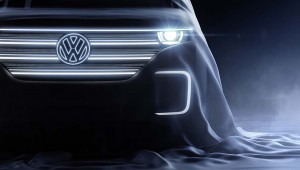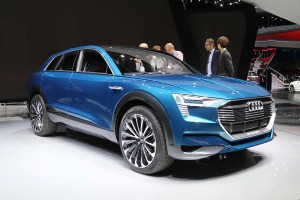Volkswagen is planning to reveal a “completely new” electric vehicle concept at the Consumer Electronics Show in Las Vegas early next month, and while the maker is being mum about specifics, inside sources suggest the concept vehicle could be a prelude to the launch of a new battery-electric minivan.
Senior VW officials have laid out plans to offer “electrified” versions of virtually every vehicle offered by the Volkswagen and Audi brands in the coming years. There is already a pure battery-electric version of the compact VW Golf, and Audi intends to launch a long-range electric SUV in 2018.
The concept “marks the beginning of a new era of affordable long-distance electromobility,” VW said in a terse statement released this week, adding that the CES show car underscores the “major changes that the car is set to go through in the next few years.”
Volkswagen’s corporate interest in electric propulsion has been underway for several years, but it appears to be gaining new emphasis as the maker tries to cope with the damage caused by its diesel emissions scandal. VW had long focused on so-called “oil burners” as a clean, high-mileage alternative to traditional gasoline engines. But analysts question whether those diesels will ever fully regain their former luster.
(VW’s global sales, share weaken in wake of diesel scandal. Click Here for the story.)
Meanwhile, industry analysts believe that the auto industry, on the whole, simply won’t be able to meet tough new global emissions and mileage standards without the extensive use of hybrids, plug-ins and pure battery-electric vehicles, or BEVs.
“Every car will be electrified,” Ulrich Hackenberg, the board member overseeing technical development at Audi said during an appearance at the Frankfurt Motor Show, where the e-tron SUV Concept debuted. Hackenberg was forced out in the wake of the diesel emissions scandal, but VW Chairman Herbert Diess is expected to maintain that goal. Diess will be a keynote speaker at the CES opening session on January 5, 2016.
A teaser image of the vehicle coming to the annual Las Vegas event hints at something quite large, with a truck-sized grille that would likely be an SUV or a modern version of the classic Volkswagen microbus. The latter is more likely, a well-placed source suggests.
(Click Here to see how the Paris climate accord will impact motorists.)
While a number of the battery-electric vehicles now available are small passenger cars, industry experts anticipate seeing more SUVs and other large models come to market over the next few years. The problem with a product like the little Volkswagen e-Golf is that there simply isn’t much room for batteries, and that means more limited range.
The general consensus – backed by growing sales at Tesla Motors – is that battery-electric vehicles need to boost range, likely to 200 miles or more, to develop a more mainstream audience.
Larger vehicles, like the Audi e-tron SUV Concept or a VW Microbus, would have more space in which to tuck a longer-range battery pack.
Volkswagen wouldn’t be the only manufacturer to consider offering an electrified minivan, if that is indeed what’s coming to CES. FCA is expected to launch an all-new version of its Chrysler Town & Country minivan at the 2016 Detroit Auto Show, which follows a week after the CES event. The new Chrysler model is expected to be offered with a plug-in hybrid option that will deliver a significant boost in fuel economy, along with a modest range in battery-only mode.
The Consumer Electronics Show has become a major showcase for alternative automotive technology – from in-car infotainment to electric propulsion — in recent years. Other senior industry executives set to speak at the show include Ford CEO Mark Fields and General Motors Chief Executive Mary Barra.
(California regulators announce new autonomous vehicle rules. Click Here for more.)




Car makers have virtually no choice but to supply EVs to try and meet the absurd 54.5 mpg CAFE requirement or face serious fines. Consumers however get to vote with their wallet. If consumers refuse to buy impractical, over-priced EVs, the Feds are screwed and can no longer force their misguided mandates on the populace.
If EVs made any sense then large trucks and local delivery vehicles that have sufficient storage area for massive battery packs, would use them. The fact is EVs are not practical for 99% of society and Obama’s efforts to force them on the public is going to backfire when he is out of office.